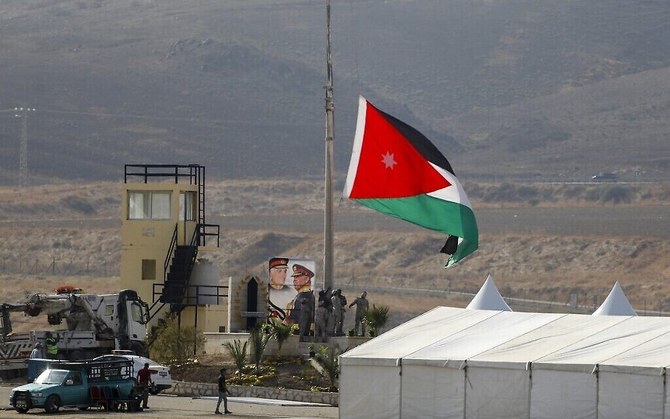Young Jordanians show they will not accept normalization with Israel

https://arab.news/y643y
More than 25 years after the signing of the 1994 Jordan-Israel peace treaty, the vast majority of Jordanians remain adamantly hostile to their neighbor to the west. And while a new generation was born during this so-called era of peace, the rejection of any form of normalization of relations with Israel continues to grow.
What is baffling to some analysts is the fact that young Jordanians, mostly university students, are now leading the movement to resist any form of normalization of ties.
Jordan and Israel enjoyed a brief phase of warm relations and peace under King Hussein and Prime Minister Yitzhak Rabin, both of whom shared a vision for a “regional Benelux” that included Jordan, Israel and a nascent Palestinian entity. This vision was shattered in 1995 when Rabin was assassinated by a Jewish radical after a series of incitements by up-and-coming Likud leader Benjamin Netanyahu.
For decades, the peace between Jordan and Israel has been described as cold; tepid at best. Governments have made deals over the years, some of them controversial, but at the public level among Jordanians there has been a general feeling of resentment and a widespread boycott of any dealings with Israel. But why?
The relationship between Jordan and the West Bank is unique in all its forms. Historically and politically, the West Bank was part of the Kingdom of Jordan between 1950 and 1967. The Jordanian Arab Army fought to defend the West Bank and East Jerusalem during the 1948 Arab-Israeli War. Many Jordanian soldiers died defending the Old City and their sacrifices prevented Israeli militias from taking the historic city.
Jordanians remember with pride such sacrifices made by their countrymen in Jerusalem and elsewhere in Palestine. Every year, they mark the anniversary of the Battle of Karameh, on March 21, 1968, when Israeli forces tried to invade the East Bank of the Jordan River and were repulsed by the Arab Army — at a cost, of course. These battles are ingrained in the national psyche.
Jordan also received waves of Palestinian refugees following the 1948 debacle and the 1967 war. Many of those refugees and displaced persons are now Jordanian nationals.
Another dimension to Jordan’s unique ties to the Palestinian cause is the Hashemite custodianship of Jerusalem’s Muslim shrines, which began with the founder of the kingdom, King Abdullah I, who was assassinated at the gates of Al-Aqsa Mosque in 1951. Even at the lowest point of ties with Israel, King Abdullah II has been consistent in reaffirming his commitment to protecting Al-Aqsa, which has been at the center of Jordanian-Israeli clashes for years.
At the popular level, Jordanians feel a special kinship with the suffering of the Palestinians. Israel has Palestinian blood on its hands, but it has also spilled Jordanian blood. In the past decade, Israel killed, in cold blood, a Jordanian judge crossing a river into the Occupied Territories in 2014, and an Israeli diplomat shot dead two Jordanians at the Israeli Embassy compound in Amman in 2017. Both crimes were committed without accountability. Such incidents have further tarnished Israel’s image among Jordanians.
And when it comes to the Israeli rejection of the two-state solution, which Jordan relentlessly supports, there is a special dimension that concerns Amman. For decades, the far right in Israel has claimed that a Palestinian state does exist, pointing to Jordan. The so-called “Jordan option” is not farcical rhetoric by a dazed Israeli politician, but a conviction that the Palestinian question can, and will, be resolved at the expense of Jordan.
At the popular level, Jordanians feel a special kinship with the suffering of the Palestinians. Israel has Palestinian blood on its hands, but it has also spilled Jordanian blood.
Osama Al-Sharif
Such existential concerns have had an effect on Jordanians, especially East Bank tribes who do not trust Israel and believe a conspiracy exists to “liquidate” the Palestinian national cause at their expense. That is why any talk about redefining the Jordanian national identity is treated with great suspicion in the country.
It is no wonder, then, that when Jordanians found out that their government had signed a letter of intent last week with Israel to begin feasibility studies for a project dubbed “electricity for water,” dozens of people, mostly university students, tried to stage a protest. They were quickly rounded up and arrested without charge. The move triggered nationwide indignation, resulting in the staging of a number of protests on Friday by thousands of people who denounced the proposed deal and called for the release of the students.
The response to the initial protest was an ill-judged move by a government that had, only a week earlier, submitted proposals designed to empower Jordanian youths and encourage them to become more politically active.
The fact that the logic behind the proposed project has baffled experts notwithstanding, the government has come under pressure to withdraw from the deal.
Jordanians, from all walks of life, will continue to resist the normalization of relations with Israel primarily because of their unique ties to the Palestinian cause. The amazing thing is that young Jordanians born after the signing of the 1994 peace treaty are now the ones leading the protest movement and inspiring the nation.
Changing, or attempting to change, such innate convictions seems to be an impossible task at this stage.
- Osama Al-Sharif is a journalist and political commentator based in Amman. Twitter: @plato010










































